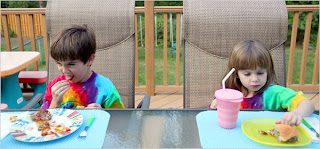"I would like some tips on how to teach a younger sibling (age 3, not in school yet due to rural location) not to pick up unwanted behaviours from his Aspie brother."
 You might be concerned that your 3-year-old will pick up unwanted behaviours because he might have Asperger’s Syndrome, also. Asperger’s does, indeed, have a genetic component.
You might be concerned that your 3-year-old will pick up unwanted behaviours because he might have Asperger’s Syndrome, also. Asperger’s does, indeed, have a genetic component.
New research in the area of Asperger’s has shown that toddler siblings of autistic children are more likely to exhibit the same atypical behaviours as their brothers and sisters with autism, even when they don’t eventually develop the disorder. Andy Shih, PhD, of the Baby Sibling Research Consortium, states that this increases the importance of careful monitoring of high-risk siblings of children with autism (or Asperger’s) for any signs of a disorder. If one should occur, you are well-situated for early intervention. If atypical behaviours occur, but there is no Asperger’s, you will feel relief at knowing that your second child does not have it.
If you have a child with Asperger’s, the odds are 50 to 100 times greater that your second child will be diagnosed with Asperger’s. At the age of three, it might be difficult to tell if the child has Asperger’s. Ask yourself the following:
- Does your younger son have age-appropriate communication skills?
- Does he follow his brother’s exact behaviours?
- Is he overreacting to sensory stimuli (e.g., actions, lights, sounds)?
- Does he cover his eyes or ears to avoid sensory stimuli?
If you answered “No” to these questions, your son is probably just imitating his older brother, and that is very common with siblings. He might see his older brother as a role model, or he sees his brother getting a lot of attention for these behaviours, and he is imitating him to get some of the attention.
If you answered “Yes” to the above questions, consider having a professional, such as an Intervention Specialist or special education teacher, observe your three-year- old when he interacts with his brother, and when he is alone. You might be thinking of waiting to see if your son outgrows these behaviours; however, if he does have Asperger’s Syndrome, you should begin early intervention. Make sure that the professional you consult is experienced in assessing autism spectrum disorders, and that his experience specifically includes Asperger’s Syndrome.
Your awareness of the sibling relationship, along with the help of a professional, and the book mentioned above will give you information and assistance to help with your three-year-old, if he, too, is diagnosed with Asperger’s Syndrome. Stay in touch with the professional involved and re-read the book so that you can provide a comprehensive level of care for both your children.

.jpg)


